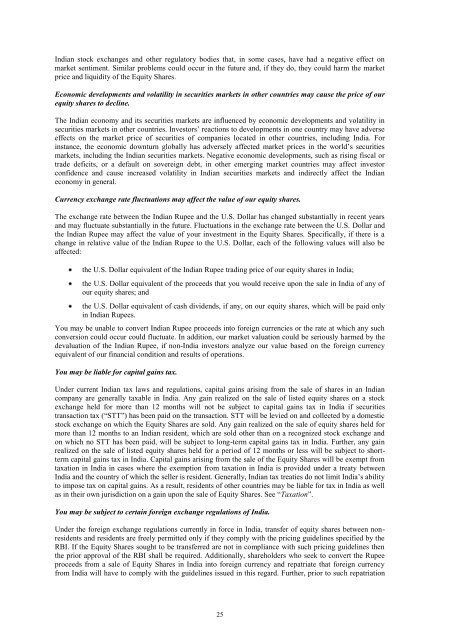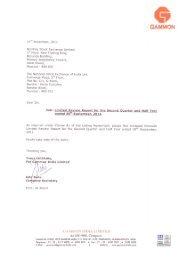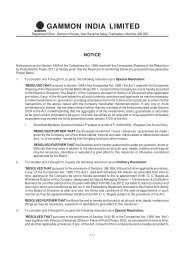GAMMON INDIA LIMITED
GAMMON INDIA LIMITED
GAMMON INDIA LIMITED
You also want an ePaper? Increase the reach of your titles
YUMPU automatically turns print PDFs into web optimized ePapers that Google loves.
Indian stock exchanges and other regulatory bodies that, in some cases, have had a negative effect on<br />
market sentiment. Similar problems could occur in the future and, if they do, they could harm the market<br />
price and liquidity of the Equity Shares.<br />
Economic developments and volatility in securities markets in other countries may cause the price of our<br />
equity shares to decline.<br />
The Indian economy and its securities markets are influenced by economic developments and volatility in<br />
securities markets in other countries. Investors‘ reactions to developments in one country may have adverse<br />
effects on the market price of securities of companies located in other countries, including India. For<br />
instance, the economic downturn globally has adversely affected market prices in the world‘s securities<br />
markets, including the Indian securities markets. Negative economic developments, such as rising fiscal or<br />
trade deficits, or a default on sovereign debt, in other emerging market countries may affect investor<br />
confidence and cause increased volatility in Indian securities markets and indirectly affect the Indian<br />
economy in general.<br />
Currency exchange rate fluctuations may affect the value of our equity shares.<br />
The exchange rate between the Indian Rupee and the U.S. Dollar has changed substantially in recent years<br />
and may fluctuate substantially in the future. Fluctuations in the exchange rate between the U.S. Dollar and<br />
the Indian Rupee may affect the value of your investment in the Equity Shares. Specifically, if there is a<br />
change in relative value of the Indian Rupee to the U.S. Dollar, each of the following values will also be<br />
affected:<br />
the U.S. Dollar equivalent of the Indian Rupee trading price of our equity shares in India;<br />
the U.S. Dollar equivalent of the proceeds that you would receive upon the sale in India of any of<br />
our equity shares; and<br />
the U.S. Dollar equivalent of cash dividends, if any, on our equity shares, which will be paid only<br />
in Indian Rupees.<br />
You may be unable to convert Indian Rupee proceeds into foreign currencies or the rate at which any such<br />
conversion could occur could fluctuate. In addition, our market valuation could be seriously harmed by the<br />
devaluation of the Indian Rupee, if non-India investors analyze our value based on the foreign currency<br />
equivalent of our financial condition and results of operations.<br />
You may be liable for capital gains tax.<br />
Under current Indian tax laws and regulations, capital gains arising from the sale of shares in an Indian<br />
company are generally taxable in India. Any gain realized on the sale of listed equity shares on a stock<br />
exchange held for more than 12 months will not be subject to capital gains tax in India if securities<br />
transaction tax (―STT‖) has been paid on the transaction. STT will be levied on and collected by a domestic<br />
stock exchange on which the Equity Shares are sold. Any gain realized on the sale of equity shares held for<br />
more than 12 months to an Indian resident, which are sold other than on a recognized stock exchange and<br />
on which no STT has been paid, will be subject to long-term capital gains tax in India. Further, any gain<br />
realized on the sale of listed equity shares held for a period of 12 months or less will be subject to shortterm<br />
capital gains tax in India. Capital gains arising from the sale of the Equity Shares will be exempt from<br />
taxation in India in cases where the exemption from taxation in India is provided under a treaty between<br />
India and the country of which the seller is resident. Generally, Indian tax treaties do not limit India‘s ability<br />
to impose tax on capital gains. As a result, residents of other countries may be liable for tax in India as well<br />
as in their own jurisdiction on a gain upon the sale of Equity Shares. See ―Taxation‖.<br />
You may be subject to certain foreign exchange regulations of India.<br />
Under the foreign exchange regulations currently in force in India, transfer of equity shares between nonresidents<br />
and residents are freely permitted only if they comply with the pricing guidelines specified by the<br />
RBI. If the Equity Shares sought to be transferred are not in compliance with such pricing guidelines then<br />
the prior approval of the RBI shall be required. Additionally, shareholders who seek to convert the Rupee<br />
proceeds from a sale of Equity Shares in India into foreign currency and repatriate that foreign currency<br />
from India will have to comply with the guidelines issued in this regard. Further, prior to such repatriation<br />
25
















